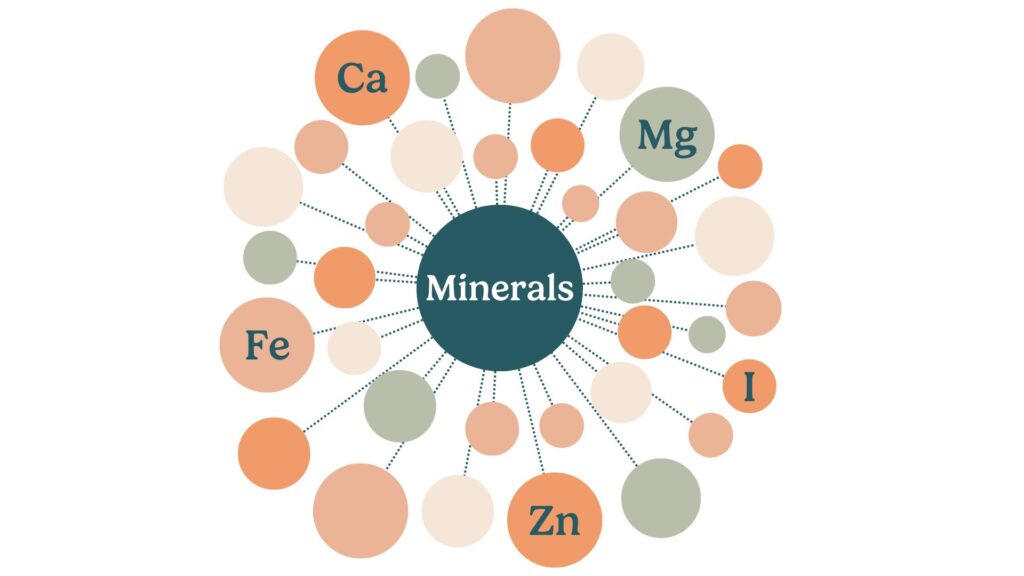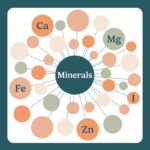minerals

Minerals
Minerals are essential nutrients that your body needs to function properly. They play important roles in bone health, blood production, nerve function, and many other physiological processes.
During breastfeeding, your baby receives important minerals through your breastmilk, which supports their growth and development.
What to watch out for
Ensuring that both you and your baby get the necessary minerals during breastfeeding is important for health and development:
- Calcium: Essential for bone health and muscle function. Make sure to consume calcium-rich foods like dairy products, leafy greens, and fortified plant-based milk. Adequate calcium intake is crucial for your baby’s developing bones and teeth. Learn more about mama nutrition and breastfeeding.
- Iron: Vital for blood production and preventing anemia. Include iron-rich foods such as red meat, beans, lentils, and fortified cereals in your diet. Iron in breastmilk is highly bioavailable, meaning your baby can absorb it efficiently.
- Zinc: Important for immune function and cell growth. Good sources of zinc include meat, shellfish, dairy, and whole grains. Ensuring sufficient zinc intake supports your baby’s immune system and overall growth.
- Magnesium: Necessary for muscle and nerve function, as well as bone health. Foods high in magnesium include nuts, seeds, whole grains, and leafy greens. Adequate magnesium helps in your baby’s development and your muscle function.
- Iodine: Crucial for thyroid function and cognitive development. Iodine-rich foods include seafood, dairy products, and iodized salt. Ensuring sufficient iodine intake supports your baby’s brain development and thyroid health.
If you have concerns about your diet or your baby’s nutrition, consult a healthcare provider or lactation consultant for personalized advice.
Physical limitations or health circumstances
Certain conditions can affect the absorption and availability of minerals:
- Dietary restrictions: If you have dietary restrictions, such as being vegan or having food allergies, ensure you are getting a balanced intake of minerals from allowed foods. A nutritionist can help you plan a diet that meets your needs.
- Health conditions: Conditions like celiac disease or inflammatory bowel disease can affect the absorption of minerals. Proper management of these conditions with the help of a healthcare provider can support better nutrient absorption.
- Supplements: In some cases, you might need to take mineral supplements to ensure adequate intake. Always consult with a healthcare provider before starting any supplements to ensure they are safe for you and your baby.
Other terms
- Bioavailability: The extent to which nutrients can be absorbed and used by the body. Breastmilk provides minerals in a highly bioavailable form for your baby.
- Trace minerals: Minerals needed in smaller amounts, such as selenium, copper, and manganese, which are still essential for health. These are also found in a balanced diet.
- Electrolytes: Minerals like sodium, potassium, and chloride that help regulate fluid balance, nerve function, and muscle contractions. Maintaining electrolyte balance is important for both you and your baby.
- Bone density: The amount of mineral matter per square centimeter of bones. Adequate calcium and magnesium intake supports bone density for you and your growing baby.
- Anemia: A condition where there is a lack of healthy red blood cells due to insufficient iron. Consuming iron-rich foods helps prevent anemia in breastfeeding mamas and their babies.


